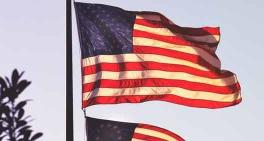Supreme Court strikes down Minnesota's voter clothing law
U.S. Supreme Court News
shirts and pins to the polls.
Minnesota had defended its law as a reasonable restriction that keeps order at polling places and prevents voter intimidation. But the justices ruled 7-2 that the state's law is too broad, violating the free speech clause of the First Amendment.
Chief Justice John Roberts wrote that "if a State wishes to set its polling places apart as areas free of partisan discord, it must employ a more discernible approach than the one Minnesota has offered here."
Most states have laws restricting what voters can wear when they cast ballots, but Minnesota's law was one of the broadest. It barred voters from casting a ballot while wearing clothing with the name of a candidate or political party. Also not allowed: clothing that references an issue on the ballot or promotes a group with recognizable political views. A National Rifle Association T-shirt or shirt with the text of the Second Amendment wouldn't be allowed, for example, according to the lawyer who argued the case for the state.
Roberts noted that Minnesota, like other states, had sought to balance a voter's ability to "engage in political discourse" with the ability to "exercise his civic duty in a setting removed from the clamor and din of electioneering."
"While that choice is generally worthy of our respect, Minnesota has not supported its good intentions with a law capable of reasoned application," he wrote.
It is unclear exactly how many states the ruling could affect beyond Minnesota. Both Minnesota and the group challenging the state's law had said there are about 10 states with laws like Minnesota's, though they disagreed significantly on which ones, agreeing only on Delaware, New Jersey, New York, Texas and Vermont.
The case before the Supreme Court dates back to 2010 and involves a dispute that began over tea party T-shirts and buttons with the words "Please I.D. Me," a reference to legislation then under discussion in Minnesota that would have required residents to show photo identification to vote. The legislation ultimately didn't become law.
Pointing to the state's statute, Minnesota officials said before the election that neither the tea party T-shirts nor those buttons would be permitted at the polls. In response, a group of voters and organizations sued.
Related listings
-
Supreme Court allows Ohio, other state voter purges
U.S. Supreme Court News 06/13/2018The Supreme Court ruled Monday that states can clean up their voting rolls by targeting people who haven't cast ballots in a while.The justices rejected, by a 5-4 vote Monday, arguments in a case from Ohio that the practice violates a federal law int...
-
High Court Rules in Dispute Over Immigrant Teen's Abortion
U.S. Supreme Court News 06/08/2018The Supreme Court ruled Monday in a case about a pregnant immigrant teen who obtained an abortion with the help of the ACLU, siding with the Trump administration and wiping away a lower court decision for the teen but rejecting a suggestion her lawye...
-
Supreme Court allows Arkansas to enforce abortion restrictions
U.S. Supreme Court News 06/03/2018The Supreme Court is allowing Arkansas to put into effect restrictions on how abortion pills are administered. Critics of a challenged state law say it could effectively end medication abortions in the state. The justices did not comment Tuesday in r...

Our Eugene Oregon Bankruptcy Practice
Since 2005, Erin Uhlemann has helped individuals and families facing financial difficulties file for bankruptcy relief. Erin's compassion and understanding of the law have helped hundreds of Oregonians achieve a financial fresh start. She started Willamette Valley Bankruptcy to focus on helping clients with bankruptcy and debt issues in the Lane County Area. Erin understands that choosing a bankruptcy attorney who makes you feel comfortable and confident can be as difficult as deciding whether to file a bankruptcy case. Because she knows that filing bankruptcy is not something that you planned to do or look forward to doing, Erin strives to make the process as easy as possible.
Because most people facing bankruptcy do not have extra money to pay fees, Willamette Valley Bankruptcy offers low upfront fees and will work with you to set up affordable payment plans to pay attorney fees and court filing fees. Consultations are always free so that you can get the answers you need before making any sort of financial commitment. If you have questions about attorney fees and payment plans, you can call or email today to get these questions answered.




